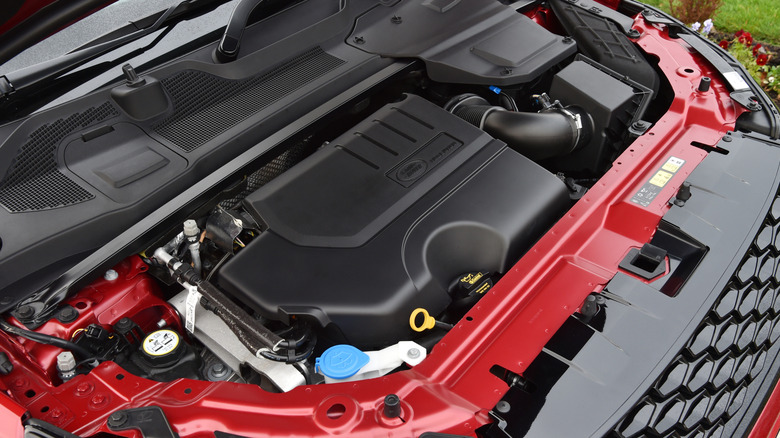This May Be The Worst Land Rover Engine Ever Made, According To Owners & Experts
Land Rover has an outstanding pedigree for both luxury features and a military heritage, a formula which should theoretically produce a car that's both reliable and well-equipped. Hardly anyone would argue the latter, with a modern Range Rover or Defender being among the most iconic mid-high budget SUVs of all time. And for the most part, many of these cars have sketchy reliability, likely due to their incredibly complex features that can go wrong. In terms of randomly dying on the side of the road, though, it's a mixed bag. Modern Land Rover hasn't enjoyed a reputation for reliability for many years, with no engine being outright "bulletproof" like the 4.0L straight six in older Jeeps.
But which engine is the outright worst? The answer will likely put shudders in some Land Rover owners and mechanics alike: the Ingenium. More specifically, the four-cylinder 2.0L Ingenium diesel, an engine with a reputation for being one of the worst engines released in the past decade. It has a remarkably long list of issues, including but not limited to DPF failure, turbocharger failure, timing chains breaking, oil dilution, and injector problems. How is it possible that an engine is so bad, though? Is it the fault of the engine itself, some sort of manufacturing or quality control bug, or is its reputation undeserved?
Of course, not everyone will have negative experiences with the 2.0 diesel Ingenium. Like most engines, all these require is careful maintenance and a sensitivity to certain conditions that may cause problems like the infamous DPF regeneration failure.
What caused the Ingenium's reputation?
The Ingenium diesel is one of the most hated four-cylinders of the modern era, or just modern engines in general, perhaps superseded by the legendary EcoBoost with the wet timing belt. The Ingenium's design faces a similar issue: a timing chain that prematurely fails, representing the most vital of all its problems. A timing belt or chain is responsible for keeping the pistons and valvetrain in sync with one another so the piston doesn't strike a valve, for example. If a chain goes bad, it'll get worse over time until it eventually snaps, at which point your internal combustion engine becomes an external combustion engine.
The other major killer of these engines, according to experts and owners, is oil dilution caused by the DPF (diesel particulate filter) not getting hot enough to regenerate properly. DPF regeneration refers to the removal of harmful soot and debris from the filter; not being able to properly regenerate leads to the filter becoming clogged, resulting in turbos and other sensitive parts suffering from poor lubrication, fuel diluting the oil, and more. These problems are compounded by short trips, in which the temperature can't get high enough for the DPF regen to do its job.
The horror stories surrounding this engine are nothing if not prolific. There's even a Facebook page dedicated to failures of this engine with over 21,000 members as of this writing. In fact, the engine has so many issues that some have even called it a profiteering scheme to make money off engines designed to fail.
Does the Ingenium have any redeeming qualities?
Ingenium engines were primarily sold in the European market, with their unique quirks likely due to more stringent emissions regulations that older Jaguar Land Rover diesels failed to meet. Unlike in the United States, however, the United Kingdom's cities are densely packed together in such a way that many individuals are simply not driving these engines long enough to filter particulates properly via DPF regen. As a result, continuous buildup occurs, leading to excessive fuel injection problems. The gasoline engines don't have this problem, and thus enjoy a far more favorable reputation than their diesel counterparts, so it's likely a problem with the diesel's design architecture rather than the engine's internals (save for the timing chain).
Overall, the Ingenium's dour reputation is primarily due to these two faults. If the timing chain were stronger and the DPF redesigned so that it heated up adequately, the rest of the engine would likely be fine. The majority of other problems, like failing turbos and excessive fuel usage, largely stem from those two root causes. Outside of this, it's likely to be as reliable (or unreliable) as any other Jaguar Land Rover engine.
Another detracting point from the Ingenium is the relative lack of any other redeeming qualities. Owners report that the engines lack enough power or efficiency to make up for the headaches the owners suffer at repair shops, and there are other, far more attractive options out there. Moral of the story: if you're looking for something that'll last a while, get a Toyota (or an expensive classic Land Rover Defender). If you're looking to burn money, get an Ingenium.
Our methodology
This particular engine isn't short of owner anecdotes concerning its reputation for failure; nevertheless, we tried to take numerous sources into account, including dozens of forums and boards, owner testimonials, mechanic opinions, and expert analyses. These included sources such as videos, articles from accredited sites, and reliability listings, all the way down to comments and posts.
Due to the scale of issues owners were experiencing with this engine, this article represents a condensed story behind why this engine's reputation is well-earned, focusing on the core problems inherent to this specific configuration. Therefore, this doesn't apply to other Ingenium engines, nor does it apply to other Jaguar Land Rover engines in general.
As always, maintenance is paramount to these engines operating normally. Jaguar Land Rover has long service intervals for Ingenium engines, leading to these issues compounding more quickly than normal. We've looked past these as maintenance errors with Jaguar Land Rover at least partially to blame, but not the engine itself, and focused more on the actual hardware problems inherent to the Ingenium's design.
If you're buying a new or used Land Rover, always be sure to do your research and check for maintenance records to see if these faults apply to you.



